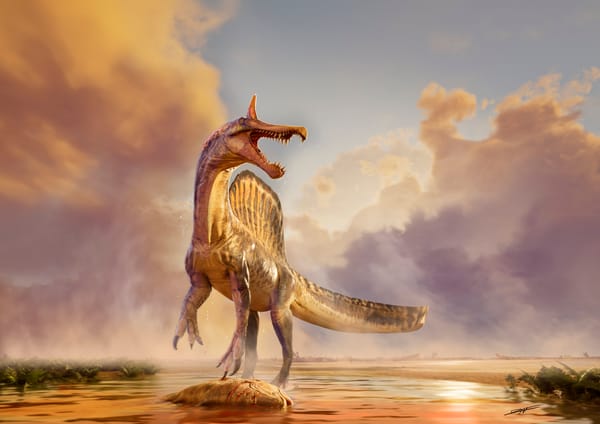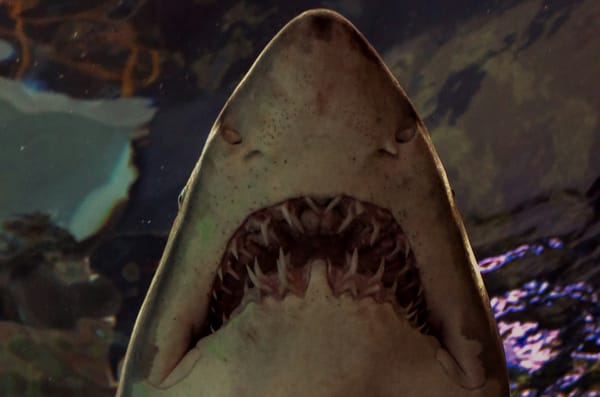The Frog Pond #15: A long shot to the Moon (and getting longer)
We won't have solar eclipses in 600 million years and more Moon facts you really don't need to worry about during your finite existence.

Happy second month of the year! Exciting things have made this Frog Pond late, more on that in the writing update. But first! Let's talk about the Moon!
(Sidenote: All of the Frog Ponds are now archived on the new platform here! Yay!)
The Moon is drifting away at the rate of fingernails
I learned this week that the Moon is inching away from the Earth, literally. The Moon moves away from the Earth at a rate of 1.5 inches (3.8 centimeters) per year1,2. This is roughly the same rate at which fingernails grow (which is a wild thing to compare planetary drifting to!)3,4.
How do we know this?
NASA began the Laser Ranging Experiments during the Apollo missions in the 60s/70s. This involved astronauts using a reflector array to take measurements in the Sea of Tranquility on the Moon. This gave much more precise measurements about the Moon's rotation, gave strong evidence to the Moon's liquid core (which I covered in a past Frog Pond!), and provided an accurate rate of recession that the Moon is making from Earth5.
Basically, NASA sends a beam of light to a reflector on the Moon and is able to measure distance by how long it takes to come back. NASA explains the process as "[like] the task of [...] using a rifle to hit a moving dime two miles away"6. Even with optimal conditions, this experiment receives only one photon every few seconds while in operation7, so the margins of error are tiny.
In 1994, the average distance between the centres of the Earth and the Moon was 385,000 KM (about 30 Earths away). Knowing the distance and rate of recession can give scientists insight into a ton of historical aspects, like analyses of ancient solar eclipses8!
But wait, that math doesn't work!
Keen eyed frogs may notice that these numbers don't work if you project them back to the timeline of the Moon's formation. 1.5 inches per year would make that collision 1.5 billion years ago, when we know it was over double that around 4.5 billion years ago9 based on rock and coral layers10.
Evidence suggests that Earth's slowing of its rotation is responsible. When the Moon was first formed from a collision of Earth and a Mars-shaped object, the Earth spun much faster than it does now. In fact, a day back then was about 5 hours long11!
Basically the faster a planet spins, the more angular momentum it has. The slower, the less angular momentum. The total angular momentum between interacting gravitational systems has to stay the same between the objects. So as the Earth slows, something else has to increase to keep that angular momentum balanced. Angular momentum is also impacted by the distance between an object and the centre of its gravitation system. So as the Earth slows, the Moon gets farther away12. I hope that makes sense, I'm not an astronomer!
How would be we impacted by a drifting Moon?
The combined factors of the Earth's rotation slowing and the Moon drifting away have a few impacts on the planet and its satellite:
- Tidal effects by the Moon's rotation (its "tidal lock" on Earth) will reduce. This will mean that Earth will permanently show only one side of the moon. You might think the Moon's already tidally locked with Earth, but in fact it does rotate! A "moon day" is just under 30 Earth days13. This would take 50 billion years to happen.
- Microseismic events such as tidal triggering of earthquakes are impacted by tidal variations (and, of course, the tides of oceans are impacted by the Moon). Tides are predictable and may also trigger volcanic events14. So changes to the Moon's position and influence on the Earth's oceans could change, though I couldn't find much information on exactly how.
- Solar eclipses will be a thing of the past. The number of eclipses will decrease until about 600 million years from now when they will cease15. So, you know, get yours in while you can.
Will we lose the Moon???
I've got good news and bad news.
The good news: It would theoretically take 15 billion years for the moon to stop moving away from the Earth16. But! It'll never escape the Earth!!
Why? Well...
The bad news: In 5 billion years, the sun will be a red giant and consume both the Earth and the Moon, obliterating both17.
So! That's! Not something we ever need to worry about! Yay?
A word from a passing frog
January was a lot! My mental health was Not Good, but I'm through the worst of it. I never used to think of myself as a workaholic, but that's just because the work I get obsessed with isn't my day job's work, it's my writing. This can be great in very small doses, or as motivation in general, but what it can unfortunately alchemize is a need to work that comes from guilt and fear instead of joy.
I'm working on it! Specifically I'm not working on any big projects as I let my brain cool down from a very intense few months of daily editing.
Writing
I finished my revisions on Lighthouse book on February 2 (one reason why this Frog Pond was delayed). I'm so proud of these edits! I've condensed the story down by over 12,000 words and made the prose a lot more direct and impactful.
I'll have more to say next month about what this all means, but... :)
Reading
I started the year strong on my GoodReads challenge! I read 9 books + 1 podcast series:
I'm Thinking of Ending Things by Iain Reid
A short cerebral horror novel about visiting your boyfriend's family while trying to break up with him but everything goes hauntingly wrong. Great voice!
Moon of the Crusted Snow by Waubgeshig Rice
An Indigenous dystopian novel featuring a remote Anishinaabe community learning an apocalyptic event's happened. Loved the prose and the tension!
The Hundred Years' War on Palestine: A History of Settler-Colonial Conquest and Resistance, 1917-2017 by Rashid Khalidi
A non-fiction book chronicling the settler-colonial roots of Palestine's occupation with both historical documents and personal family history. Highly recommend!
The Forest Demands Its Due by Kosoko Jackson
A gripping YA dark academia/horror novel about a Black student's induction into a powerful school and his supernatural connection to the nearby labyrinthian forest. Great lore and imagery!
Beholder by Ryan La Sala
A young man who can see the past through mirrors is hunted by an eldritch deity who desperately wants him to behold it. Such a spiral of a book in the best way!
Hell Followed With Us by Andrew Joseph White
A dystopian YA novel featuring a trans boy's fight for freedom against a fascist evangelical death cult as he's slowly turned into a monster. Such a compelling premise that takes big narrative swings!
The Hunger Games by Suzanne Collins
A re-read of the modern classic dystopian novel. I loved taking in a lot of narrative and prose elements that I didn't as a teenager!
There's No Way I'd Die First by Lisa Springer
A trope-loving YA horror novel about a horror movie fan's attempt to gain popularity by inviting influencers over for a scary night, only to have her hired scary clown actually start murdering people.
So Let Them Burn by Kamilah Cole
A second-world fantasy inspired by Jamaica featuring dragons, mecha-dragons, sisters at odds, magic-granting deities, and a post-war struggle for power. I loved the concept of "chosen one has to deal with her trauma and impact after her purpose is over". A fun read!
Welcome to Night Vale #151 - 200
A seminal comedy/horror podcast featuring a small desert town where every conspiracy is true. I'm glad I've stuck with WTNV on this listen all the way to 200 and beyond and how much it keeps surprising me!
Thanks for reading! If you enjoy The Frog Pond, please share with your friends - it really helps, especially now that I'm off Substack.
Footnotes
1: https://www.iflscience.com/the-moon-is-slowly-moving-away-from-earth-will-we-ever-drift-apart-70642
2: https://eclipse.gsfc.nasa.gov/SEhelp/ApolloLaser.html
4: https://science.nasa.gov/earth/moon/10-things-what-we-learn-about-earth-by-studying-the-moon/
5: https://eclipse.gsfc.nasa.gov/SEhelp/ApolloLaser.html
6: https://eclipse.gsfc.nasa.gov/SEhelp/ApolloLaser.html
7: https://eclipse.gsfc.nasa.gov/SEhelp/ApolloLaser.html
8: https://eclipse.gsfc.nasa.gov/SEhelp/ApolloLaser.html
13: https://www.livescience.com/does-moon-rotate.html
14: https://agupubs.onlinelibrary.wiley.com/doi/10.1029/2006GL028190
15: https://www.iflscience.com/the-moon-is-slowly-moving-away-from-earth-will-we-ever-drift-apart-70642
16: https://www.livescience.com/space/the-moon/will-earth-ever-lose-its-moon





